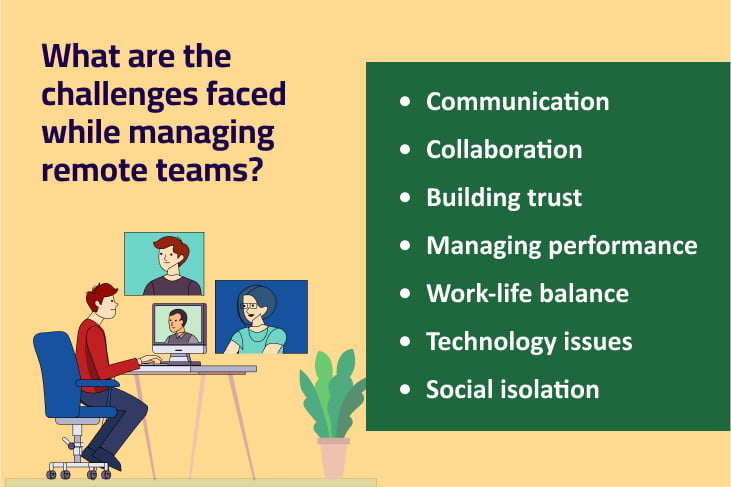Teams working remotely from separate cities, nations, or even continents are becoming more common in the current digital era. Thus, it becomes a little difficult to manage remote teams and get the work done. In this post, we will go through the best practices for managing remote teams.
What are the challenges faced while managing remote teams?

Managing remote teams presents a unique set of challenges that can impact productivity, communication, and team cohesion. Some of the key challenges include:
- Communication: Remote teams may experience communication problems in the absence of in-person contacts. Relying only on textual communication might result in misunderstandings that cause delays, uncertainty, and irritation.
- Collaboration: Working together on a project might be more difficult when team members are not in the same place. Effective task coordination, feedback sharing, and idea generation may be more difficult, particularly when working across time zones.
- Building trust: In a remote work environment, developing trust among team members might be more difficult. In the absence of opportunities for informal conversations or mutual observation of work habits, trust and rapport-building among team members may be difficult to establish.
- Managing performance: Monitoring the performance of remote team members can be more difficult than in a traditional office setting. Managers may find it challenging to assess productivity, track progress on tasks, and provide timely feedback. Thus, even if managing remote teams becomes an ease, performance management would be hard.
- Work-life balance: Remote work can blur the boundaries between work and personal life, leading to potential burnout and decreased job satisfaction. Without clear boundaries, remote employees may find it challenging to disconnect from work and recharge.
- Technology issues: Because remote work relies heavily on technology, efficiency can be negatively impacted by technical problems like hardware malfunctions, software bugs, or internet outages.
- Social isolation: For team members who are socially anxious, working remotely can be particularly lonely. In the absence of the companionability that comes with a shared workspace, remote workers might feel cut off from their coworkers and the company culture.
How to manage a remote team?
An effective aid in managing remote teams will be a deliberate strategy that prioritizes trust, cooperation, and communication.
- Assign each team member specific duties, responsibilities, objectives, and expectations. Make certain that everyone is aware of their goals, due dates, and KPIs.
- Keep lines of communication with your remote workforce open and honest. Plan frequent team meetings, one-on-one conversations, and check-ins to talk about progress, resolve issues, and give feedback.
- To improve communication, monitor progress, and effectively handle tasks, make use of collaboration and project management technologies like Alian Hub.
- Set definite objectives and benchmarks for your remote staff to strive toward. To keep everyone motivated and engaged, break down huge projects into smaller, more achievable jobs with clear deadlines.
- Provide chances for brainstorming, idea sharing, and problem-solving to foster cooperation and teamwork among members of remote teams. To encourage group conversations and document sharing, employ virtual collaboration technologies.
- Make certain that team members working remotely have access to the tools, instruction, and assistance they require to succeed. Provide them with direction, coaching, and chances for professional growth to enable them to advance in their positions.
- Communicate openly, show empathy, and be responsive to their needs and concerns. Lead by example in terms of work ethic, professionalism, and collaboration.
- Build trust with your remote team members by empowering them to make decisions, recognizing their contributions, and fostering a culture of accountability and transparency. Trust is essential for effective collaboration and team cohesion.
- Create opportunities for remote team members to socialize and connect with each other on a personal level. Organize virtual team-building activities or online social events to build relationships.
- Continuously evaluate your remote management strategies and processes to identify areas for improvement. Get feedback from remote team members and be willing to make adjustments based on their experiences.
Conclusion
Building trust, being an active leader, communicating clearly, and utilizing the right tools and technology are all essential to managing remote teams successfully. Managers may enable remote teams to succeed in today’s dynamic work environment by putting best practices.
Those include establishing clear objectives, encouraging open communication, utilizing collaboration technologies, and offering assistance and resources into practice. Long-term success also depends on encouraging work-life balance, setting a good example, and regularly assessing and enhancing remote management techniques.
Frequently asked questions
How do I manage remote teams virtually?
To manage remote teams virtually, establish clear communication channels, set expectations, provide support, foster trust, and use tools like video conferencing and project management software.
What strategies do you use when managing remote teams?
Strategies for managing remote teams include regular check-ins, setting clear goals, using collaboration tools, encouraging virtual team-building, providing flexibility and support, and empowering team members.
How do you ensure remote workers are working?
Ensure remote workers are working by setting clear goals, maintaining transparent communication, monitoring performance metrics, using time tracking tools if necessary, focusing on results, and scheduling regular check-in meetings.
How can I ensure productivity in my remote team?
Set clear goals and expectations, establish regular check-ins, provide necessary resources and support, and foster a positive team culture focused on accountability and results.
What tools can I use to manage remote teams?
There are various collaboration and project management tools available, including Alian Hub that facilitate communication, task management, and collaboration among remote team members.

